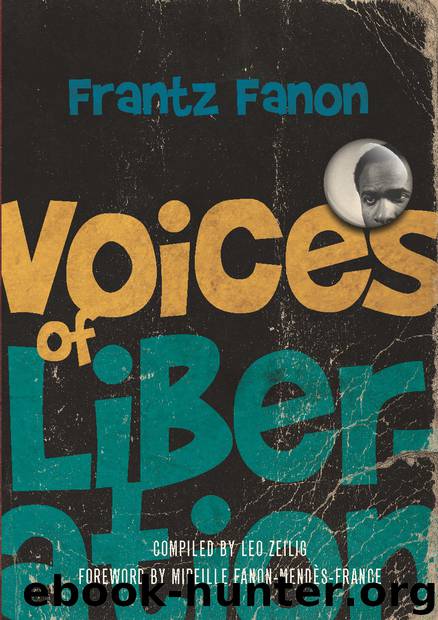Voices of Liberation by Leo Zeilig

Author:Leo Zeilig
Language: eng
Format: epub
Publisher: Perseus Books, LLC
Published: 2017-11-05T16:00:00+00:00
It is understandable that in this atmosphere, daily life becomes quite simply impossible. You can no longer be a fellah, a pimp, or an alcoholic as before. The violence of the colonial regime and the counter-violence of the native balance each other and respond to each other in an extraordinary reciprocal homogeneity. This reign of violence will be the more terrible in proportion to the size of the implantation from the mother country. The development of violence among the colonised people will be proportionate to the violence exercised by the threatened colonial regime. In the first phase of this insurrectional period, the home governments are the slaves of the settlers, and these settlers seek to intimidate the natives and their home govermments at one and the same time. They use the same methods against both of them. The assassination of the Mayor of Evian, in its method and motivation, is identifiable with the assassination of Ali Boumendjel. For the settlers, the alternative is not between Algérie algérienne and Algérie française but between an independent Algeria and a colonial Algeria, and anything else is mere talk or attempts at treason. The settler’s logic is implacable and one is only staggered by the counter-logic visible in the behaviour of the native insofar as one has not clearly understood beforehand the mechanisms of the settler’s ideas. From the moment that the native has chosen the methods of counter-violence, police reprisals automatically call forth reprisals on the side of the nationalists. However, the results are not equivalent, for machine-gunning from airplanes and bombardments from the fleet go far beyond in horror and magnitude any answer the natives can make. This recurring terror de-mystifies once and for all the most estranged members of the colonised race. They find out on the spot that all the piles of speeches on the equality of human beings do not hide the commonplace fact that the seven Frenchmen killed or wounded at the Col de Sakamody kindles the indignation of all civilised consciences, whereas the sack of the douars12 of Guergour and of the dechras of Djerah and the massacre of whole populations – which had merely called forth the Sakamody ambush as a reprisal – all this is of not the slightest importance. Terror, counter-terror, violence, counter-violence: that is what observers bitterly record when they describe the circle of hate, which is so tenacious and so evident in Algeria.
In all armed struggles, there exists what we might call the point of no return. Almost always it is marked off by a huge and all-inclusive repression which engulfs all sectors of the colonised people. This point was reached in Algeria in 1955 with the 12 000 victims of Phillippeville, and in 1956 with Lacoste’s instituting of urban and rural militias.13
Then it became clear to everybody, including even the settlers, that ‘things couldn’t go on as before.’ Yet the colonised people do not chalk up the reckoning. They record the huge gaps made in their ranks as a sort of necessary evil.
Download
This site does not store any files on its server. We only index and link to content provided by other sites. Please contact the content providers to delete copyright contents if any and email us, we'll remove relevant links or contents immediately.
Waking Up in Heaven: A True Story of Brokenness, Heaven, and Life Again by McVea Crystal & Tresniowski Alex(37811)
Empire of the Sikhs by Patwant Singh(23086)
We're Going to Need More Wine by Gabrielle Union(19046)
Hans Sturm: A Soldier's Odyssey on the Eastern Front by Gordon Williamson(18592)
Leonardo da Vinci by Walter Isaacson(13336)
The Radium Girls by Kate Moore(12028)
Tools of Titans by Timothy Ferriss(8396)
Educated by Tara Westover(8054)
How to Be a Bawse: A Guide to Conquering Life by Lilly Singh(7486)
Permanent Record by Edward Snowden(5847)
The Last Black Unicorn by Tiffany Haddish(5636)
The Rise and Fall of Senator Joe McCarthy by James Cross Giblin(5280)
Promise Me, Dad by Joe Biden(5153)
The Wind in My Hair by Masih Alinejad(5095)
A Higher Loyalty: Truth, Lies, and Leadership by James Comey(4964)
The Crown by Robert Lacey(4817)
The Iron Duke by The Iron Duke(4356)
Joan of Arc by Mary Gordon(4112)
Stalin by Stephen Kotkin(3966)
